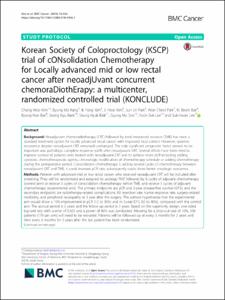Korean Society of Coloproctology (KSCP) trial of cONsolidation Chemotherapy for Locally advanced mid or low rectal cancer after neoadjUvant concurrent chemoraDiothErapy: a multicenter, randomized controlled trial (KONCLUDE)
- Affiliated Author(s)
- 백성규
- Alternative Author(s)
- Baek, Seong Kyu
- Journal Title
- BMC Cancer
- ISSN
- 1471-2407
- Issued Date
- 2018
- Keyword
- Chemoradiotherapy; Consolidation chemotherapy; Disease free survival; Pathologic complete response; Rectal cancer
- Abstract
- BACKGROUND:
Neoadjuvant chemoradiotherapy (CRT) followed by total mesorectal excision (TME) has been a standard treatment option for locally advanced rectal cancer with improved local control. However, systemic recurrence despite neoadjuvant CRT remained unchanged. The only significant prognostic factor proven to be important was pathologic complete response (pCR) after neoadjuvant CRT. Several efforts have been tried to improve survival of patients who treated with neoadjuvant CRT and to achieve more pCR including adding cytotoxic chemotherapeutic agents, chronologic modification of chemotherapy schedule or adding chemotherapy during the perioperative period. Consolidation chemotherapy is adding several cycles of chemotherapy between neoadjuvant CRT and TME. It could increase pCR rate, subsequently could show better oncologic outcomes.
METHODS:
Patients with advanced mid or low rectal cancer who received neoadjuvant CRT will be included after screening. They will be randomized and assigned to undergo TME followed by 8 cycles of adjuvant chemotherapy (control arm) or receive 3 cycles of consolidation chemotherapy before TME, and receive 5 cycles of adjuvant chemotherapy (experimental arm). The primary endpoints are pCR and 3-year disease-free survival (DFS), and the secondary endpoints are radiotherapy-related complications, R0 resection rate, tumor response rate, surgery-related morbidity, and peripheral neuropathy at 3 year after the surgery. The authors hypothesize that the experimental arm would show a 15% improvement in pCR (15 to 30%) and in 3-year DFS (65 to 80%), compared with the control arm. The accrual period is 2 years and the follow-up period is 3 years. Based on the superiority design, one-sided log-rank test with α-error of 0.025 and a power of 80% was conducted. Allowing for a drop-out rate of 10%, 358 patients (179 per arm) will need to be recruited. Patients will be followed up at every 3 months for 2 years and then every 6 months for 3 years after the last patient has been randomized.
DISCUSSION:
KONCLUDE trial aims to investigate whether consolidation chemotherapy shows better pCR and 3-year DFS than adjuvant chemotherapy alone for the patients who received neoadjuvant CRT for locally advanced rectal cancer. This trial is expected to provide evidence to support clear treatment guidelines for patients with locally advanced rectal cancer.
- Department
- Dept. of Surgery (외과학)
- Publisher
- School of Medicine (의과대학)
- Citation
- Chang Woo Kim et al. (2018). Korean Society of Coloproctology (KSCP) trial of cONsolidation Chemotherapy for Locally advanced mid or low rectal cancer after neoadjUvant concurrent chemoraDiothErapy: a multicenter, randomized controlled trial (KONCLUDE). BMC Cancer, 18(1), 538–538. doi: 10.1186/s12885-018-4466-7
- Type
- Article
- ISSN
- 1471-2407
- Appears in Collections:
- 1. School of Medicine (의과대학) > Dept. of Surgery (외과학)
- 파일 목록
-
-
Download
 oak-2018-0667.pdf
기타 데이터 / 904.91 kB / Adobe PDF
oak-2018-0667.pdf
기타 데이터 / 904.91 kB / Adobe PDF
-
Items in Repository are protected by copyright, with all rights reserved, unless otherwise indicated.